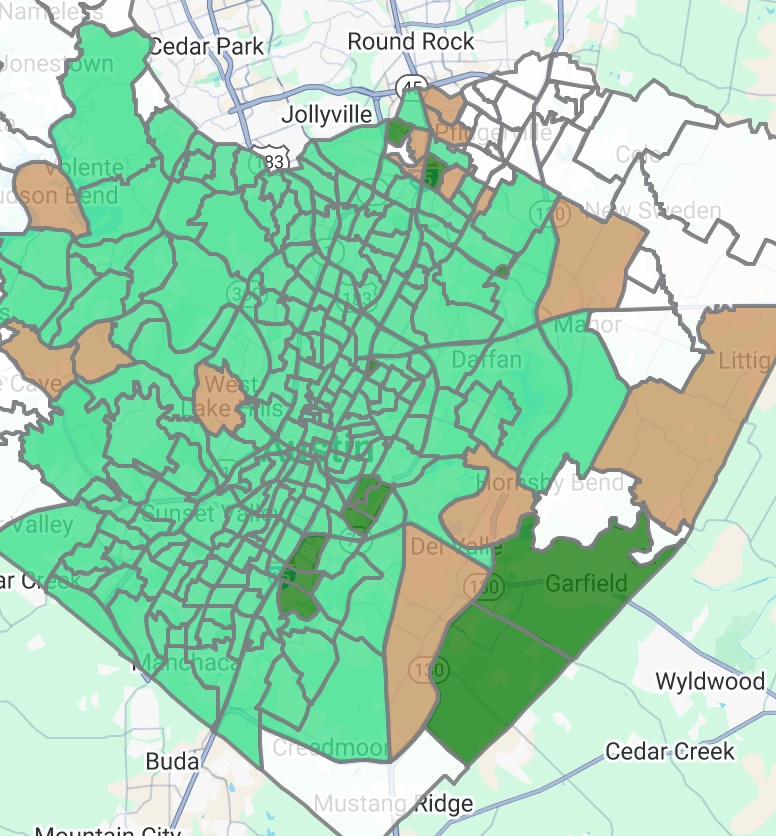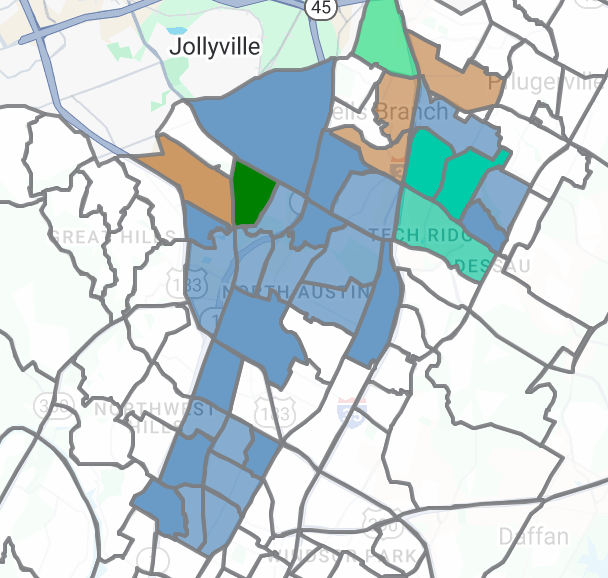Could Watson lose a runoff?
And what about District 7?
We still don't know if there will be a runoff in the mayoral race. Kirk Watson currently is just above the 50% threshold needed to claim victory, but there are still 3,200 outstanding provisional ballots, as well as an undetermined number of mail-in and overseas ballots, to be counted.
What is a provisional ballot? KUT explains:
These ballots are given to people who want to vote, but have a discrepancy with their voter registration. Maybe their information was entered wrong or their address was not up to date. Or maybe the person had the wrong ID when they showed up to vote.
When this happens, poll workers let the person cast a provisional ballot, but it's not counted right away; it must go through a verification process.
...There are a couple ways a provisional ballot will be counted.
If a voter came to the polls without a proper ID, the person can still cast a ballot. But they must later present their ID to the elections office up to a certain date after the election for the vote to be counted.
If a person requested a mail-in ballot but didn't receive it, they can vote provisionally as well. The provisional ballot will be accepted as long as the mail-in ballot isn't. Davis' team helps the board determine if that mail-in ballot was submitted.
So, it's not clear how many of those 3,200 ballots will ultimately be counted. But the bottom line is that Watson has to win half of all of the remaining ballots that are counted.
My gut tells me that Watson will perform above-average with mail-in ballots because the great majority of mail voters are seniors. I think he would perform below-average with provisional ballots, because those who have issues with their registration are probably younger and poorer on average. Why? Cuz they're more likely have recently changed addresses or simply be unfamiliar with the process.
But c'mon, it's not like Watson could lose a runoff against Carmen Llanes Pulido...right?
I don't think so, but let's just talk about this for a second. Excuse me while I partake in a bit of punditry.
On the surface, Watson's advantages appear overwhelming. He finished the general election 30 points ahead of Llanes Pulido, he has a big campaign war chest AND an outside PAC spending on his behalf that can raise hundreds of thousands of dollars from a handful of wealthy donors at the drop of the hat, he has the support of the entire local political class and business community...what could possibly go wrong?
Well, a runoff is what could go wrong. Runoffs are wacky. Those who turn out for runoffs are very different from the broader electorate. In some ways, they are different in ways that typically favor Watson: they are older, richer and much more likely to come from West Austin, which is where Watson performs best.
The perfect storm for Llanes Pulido would resemble Alison Alter's 2016 runoff victory over Sheri Gallo in West Austin's District 10. Gallo finished well ahead of Alter in the general election, finishing just below the 50% threshold, but then got beat 2-to-1 in the runoff because the much smaller runoff electorate was dominated by voters pissed about Gallo's support for a couple of controversial developments and liberals who were chomping at the bit in the wake of the first Trump victory to beat any Republican (Gallo was sort of a Republican).
In theory, Llanes Pulido is well-suited to assemble that coalition. She is definitely anti-development and will have the wholehearted support of Austin's fading NIMBY movement. Her campaign has not been particularly lefty, but she could perhaps frame herself as the progressive candidate and paint Watson as Republican lite due to his well-established relationships with state GOP leaders and the oodles of money he's raised from rich Republicans.
The problem with this theory is that there aren't big signs of erosion of Watson's West Austin base. He got about 70% of the vote in the two big Tarrytown precincts, while Llanes Pulido got about 6% and Kathie Tovo got about 15%.
Llanes Pulido got a lot of her votes from eastern crescent precincts where turnout will be extremely low in the runoff. This is in contrast to Celia Israel, who in the general election two years ago carried almost every precinct east of Mopac, and handily beat Watson in highly-engaged Central Austin neighborhoods. This time, Watson only came in second in a handful of precincts across the city.
In the map below, the dark green precincts are where Llanes Pulido came in first. The brown ones are either weird ghost precincts where no votes were cast or where there was a tie for first place.

Israel also had a much broader tent. She earned the support of a lot of progressives, but she also attracted votes, volunteers and money from the city's burgeoning urbanist movement. Israel also touted the endorsements of several City Council members, the Statesman and the Chronicle and many other prominent liberal activists. None of that can be said about Llanes Pulido.
Now, what about District 7?
In District 7, Mike Siegel finished in first with 40% of the vote and Gary Bledsoe came in a distant second with 19%.

Does Bledsoe have a shot in the runoff? Maybe. Bledsoe's base of support comes from older residents who are against HOME and other pro-housing reforms; these are the kinds of people who show up for runoff elections.
But a warning sign for Bledsoe is that he didn't perform well in the Central Austin precincts where anti-growth sentiment is historically strongest and where people are most likely to participate in low turnout elections. In fact, the only precinct he carried (dark green) is in Northwest Austin, while Siegel dominated in the central neighborhoods (light blue).

Frankly, if there is a candidate well-positioned to benefit from liberals hungry to get a win locally in the wake of a devastating presidential election, it's Siegel, whose platform speaks to national progressive values on housing, the environment, etc. Bledsoe, in contrast, is frankly running a far narrower campaign focused on opposition to pro-housing reforms and distrust of city government.
We'll see!
If somebody forwarded you this email, please consider subscribing to the newsletter by visiting the website.





